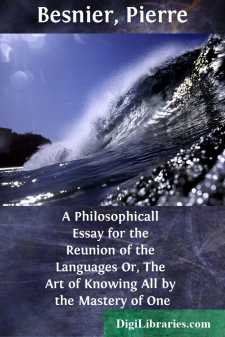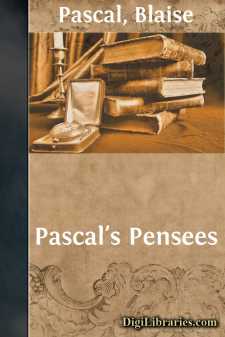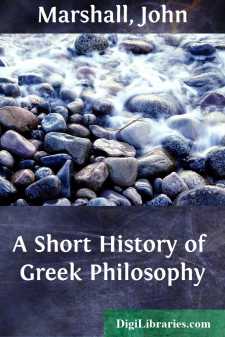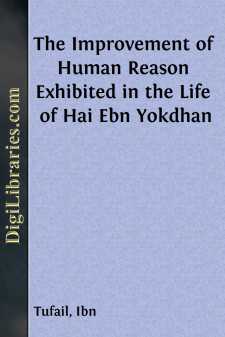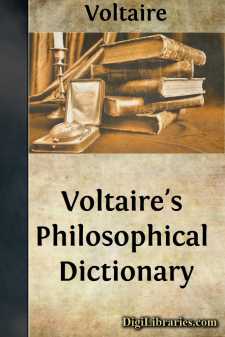Philosophy
- Aesthetics 11
- Eastern 1
- Ethics & Moral Philosophy 2
- General 30
- Hindu 2
- History & Surveys 3
- Logic 1
- Metaphysics 3
- Political 1
- Religious 7
- Social 3
- Taoist 1
Philosophy Books
Sort by:
CHAPTER I A. INTRODUCTION The Protestant Reformation marked an era both in life and thought for the modern world. It ushered in a revolution in Europe. It established distinctions and initiated tendencies which are still significant. These distinctions have been significant not for Europe alone. They have had influence also upon those continents which since the Reformation have come under the dominion...
more...
by:
Pierre Besnier
READER. Meeting by chance with this ingenuous offer, I thought it might not be improper since I found it in another dresse, to make it speak another Language too, which among the most creditable of Europe, hath not desisted from its claim to Antiquity: There are very few Nations but have, at sometime or other, laid in their pretences to a supremacy for their Language, and have boasted an assistance...
more...
PERCY BYSSHE SHELLEY, AS A PHILOSOPHER AND REFORMER. A PAPER READ BEFORE THE NEW YORK LIBERAL CLUB, ON FRIDAY, AUGUST 6TH, 1875. "Let us see the Truth, whatever that may be."—SHELLEY, 1822. Mr. Vice-President and Members of the Liberal Club: "The Blood of the Martyr is the Seed of the Church." Persecution ever fails in accomplishing its desired ends, and as a rule lays the...
more...
by:
Blaise Pascal
INTRODUCTION It might seem that about Blaise Pascal, and about the two works on which his fame is founded, everything that there is to say had been said. The details of his life are as fully known as we can expect to know them; his mathematical and physical discoveries have been treated many times; his religious sentiment and his theological views have been discussed again and again; and his prose...
more...
by:
George Santayana
Whether Chaos or Order lay at the beginning of things is a question once much debated in the schools but afterward long in abeyance, not so much because it had been solved as because one party had been silenced by social pressure. The question is bound to recur in an age when observation and dialectic again freely confront each other. Naturalists look back to chaos since they observe everything growing...
more...
by:
John Marshall
THE SCHOOL OF MILETUS The question of Thales—Water the beginning of things—Soul in all things—Mystery in science—Abstraction and reality—Theory of development I. THALES.—For several centuries prior to the great Persian invasions of Greece, perhaps the very greatest and wealthiest city of the Greek world was Miletus. Situate about the centre of the Ionian coasts of Asia Minor, with four...
more...
I. INTRODUCTORY CHAPTER I THE MEANING OF THE WORD "PHILOSOPHY" IN THE PAST AND IN THE PRESENT I must warn the reader at the outset that the title of this chapter seems to promise a great deal more than he will find carried out in the chapter itself. To tell all that philosophy has meant in the past, and all that it means to various classes of men in the present, would be a task of no small...
more...
by:
Ibn Tufail
THE PREFACE. When Mr. Pococke first publish'd this Arabick Author with his accurate Latin Version, Anno 1671. Dr. Pococke his Father, that late eminent Professor of the Oriental Languages in the University of Oxford, prefix'd a Preface to it; in which he tells us, that he has good Reason to think, that this Author was contemporary with Averroes, who died very ancient in the Year of the Hegira...
more...
by:
Voltaire
ADULTERY Note on a Magistrate Written about 1764 A senior magistrate of a French town had the misfortune to have a wife who was debauched by a priest before her marriage, and who since covered herself with disgrace by public scandals: he was so moderate as to leave her without noise. This man, about forty years old, vigorous and of agreeable appearance, needs a woman; he is too scrupulous to seek to...
more...
by:
George Santayana
I THE INTELLECTUAL TEMPER OF THE AGE The present age is a critical one and interesting to live in. The civilisation characteristic of Christendom has not disappeared, yet another civilisation has begun to take its place. We still understand the value of religious faith; we still appreciate the pompous arts of our forefathers; we are brought up on academic architecture, sculpture, painting, poetry, and...
more...



